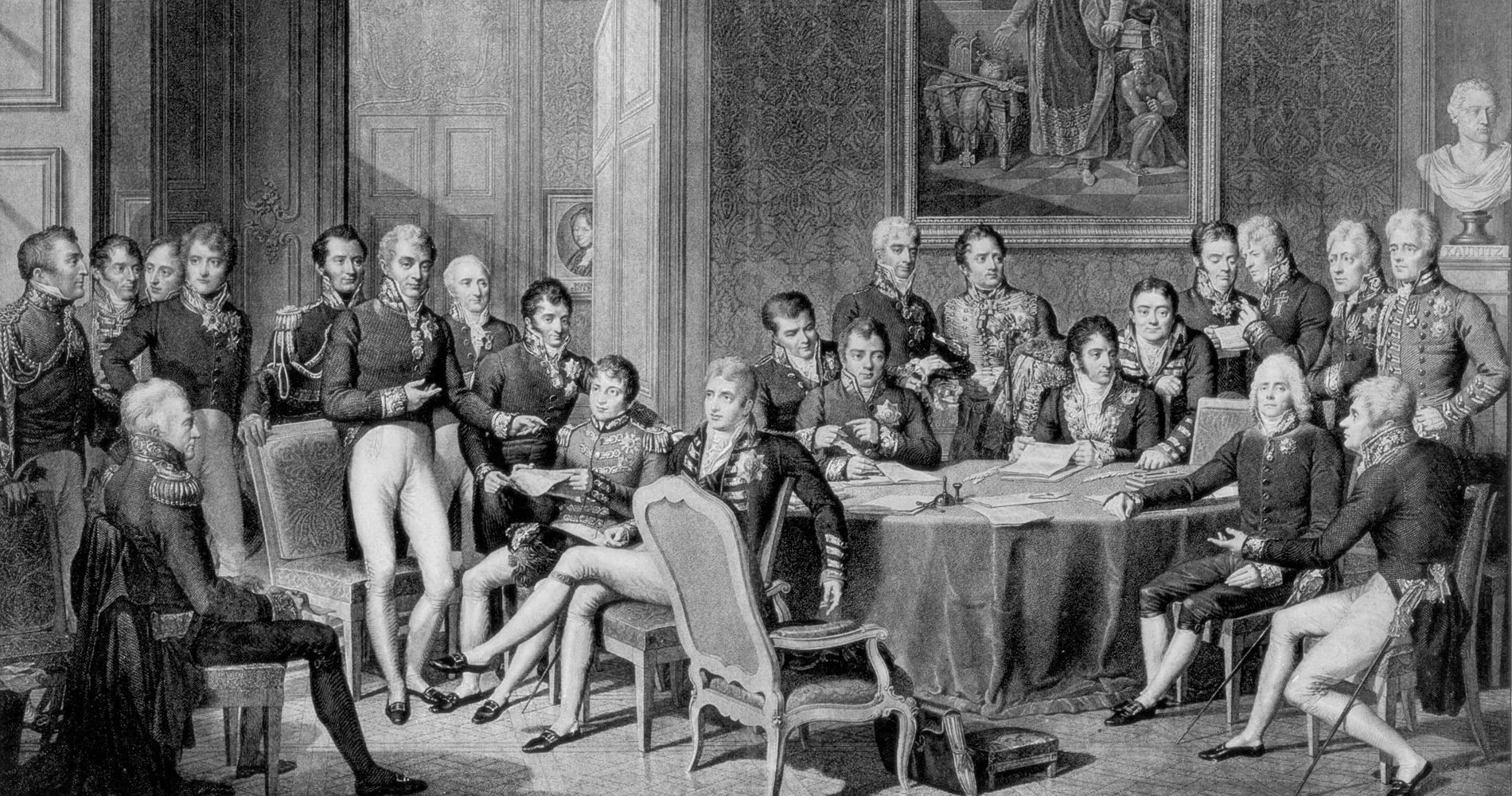The first Congress of Vienna, held in 1814-1815, led to peace in Europe for nearly 100 years, 1815-1914. It led to a Europe which could resolve conflicts through diplomacy rather than wars. It can be regarded as the first step towards an international order based on conflict management through consensus, and a predecessor of the United Nations, the OSCE and other important organizations. Europe in the 21st century needs a new Congress of Vienna, an inclusive forum for diplomacy involving all European countries to achieve peace, security and cooperation, essential for creating European strategic autonomy.
Frances Mautner Markhof
29 February 2024
Arabic version | Chinese version | French version | German version | Russian version | Spanish version
The first Congress of Vienna, held in 1814-1815, led to peace in Europe for nearly 100 years, 1815-1914. It also represented a transition to a Europe which could resolve conflicts through diplomacy rather than wars. It was also the first step in creating what would become an international format and order based on conflict management through consensus, and may be regarded as a predecessor of the United Nations, the OSCE and other important organizations.
Now, in the 21st century, Europe needs a new Congress of Vienna, an inclusive forum for diplomacy to achieve European peace, security and cooperation. This means including not only the EU and European NATO countries but also Russia and other European OSCE countries. The involvement and cooperation of all of these countries are essential for creating European strategic autonomy through a functioning European security system, which Europe must create and maintain with its own resources.
A new European security order would in fact advance its security interests in a way that would not require an enemy, a creation of “the other” so essential for building up and maintaining excessively large, expensive military capabilities. The raison d’être of NATO is outdated, but nevertheless continues to reflect the aims expressed by its first Secretary General, Lord Ismay of the UK, when he stated that NATO was created “to keep the Soviet Union out, the Americans in, and the Germans down.”
Thus, a new Congress of Vienna must develop– through negotiation, cooperation and compromise—a European-led and -controlled security system, which requires the political, military and financial commitments of all European states involved. In so doing, the Congress must deal with the fact that the US, with its many military bases and nuclear weapons in Europe, has become not only the most powerful member of NATO but also the most powerful “European” country.
Outsourcing Europe relates to the relinquishing of key aspects of Europe’s sovereignty to the US in matters essential not only for European defense, security and foreign policy but also for key political, financial, energy and other matters. US primacy persists in all European defense- and security-related matters, including US-imposed sanctions which have had a large and disproportionately negative economic/political//financial impact on EU economies.
European NATO countries have outsourced their defense and security not only through the US control of NATO and the many US military bases and assets in Europe, but also by accepting the stationing of US nuclear weapons in five European NATO countries. These Nuclear Sharing (NS) arrangements are based on NATO’s policy of extended nuclear deterrence, whereby certain non-nuclear weapons states which are NATO members accept the stationing of US nuclear weapons on their territories and provide for their own armed forces to deliver these weapons in times of war.
Not only can extended nuclear deterrence be provided to US allies without stationing nuclear weapons on their territories, as is the case with the Republic of Korea and Japan, but NS also violates the obligations of NPT (Non Proliferation Treaty) Articles I, II and VI of both the Nuclear Weapons States (NWS) and Non-Nuclear Weapons States (NNWS) involved.
Moreover, US NS arrangements with NATO allies and US military bases in Europe, while cementing US power and presence in Europe, ultimately decrease rather than increase the security and stability of Europe and ensure that Europe will be a main theater of any potential future conflict between NATO and Russia.
NATO’s initial raison d’être was to counter the former Warsaw Pact, which no longer exists. But under US leadership it has found a new raison d’être in identifying Russia as the common adversary/enemy, which NATO claims wants to regain control of the former Soviet Union countries, but which Russia strongly denies. Nevertheless, threats and threat perceptions, both justified and unjustified, by all sides continue to fuel this adversarial relationship, especially since Russia attacked Ukraine in February 2022.
At the end of the Cold War in 1991, Russia was interested to create and participate in a pan-European security system, not in NATO. This could have been achieved through strengthening the CSCE (the Conference on Security Cooperation in Europe), now the OSCE, (the Organization for Security and Cooperation in Europe). But this was resisted by those who considered themselves the “winners” in the Cold War and preferred a NATO-based security system in Europe. Thus, a critical opportunity was lost to avoid making a declared enemy of Russia, one of the key countries responsible for the Allied victory in WWII.
George Kennan in a New York Times piece of 2 May 1998 stated that NATO eastward expansion is a “tragic mistake…no one was threatening anybody else.” A key factor influencing Russia’s decision to intervene in Ukraine was NATO’s eastward expansion up to Russia’s borders, violating promises not to do so made upon the re-unification of Germany in 1990. This eastward expansion of NATO turned out to be, as Kennan and other renowned experts had predicted, a “tragic mistake.”
This was resisted, repeatedly but peacefully, by Russia, up to the point when US/NATO, in response to the “Maidan Revolution” and other events, sought to include Ukraine as a potential NATO member. It flooded Ukraine with weapons and military advisors and Ukraine flooded NATO, the EU and the media with demands for membership, money and military support. Based on history and reality, it is nevertheless clear that ultimately the Russia-Ukraine conflict must end with a negotiated settlement. It is in the interest of all European countries that this happens sooner rather than later.
At the 2007 Munich Security Conference Russian President Vladimir Putin proposed a pan-European security structure for all European countries including Russia. This proposal was rejected by the West, predominantly NATO and its leading member, the US. In this connection, it is important to recall that France participated as an equal partner in the original Congress of Vienna, despite the fact that it was the predominance of one power, France, which was the main threat to Europe’s peace and security at that time. France’s role at the Congress was central to establishing a new and long-lasting balance-of-power equilibrium in Europe.
Indeed, by expanding NATO membership, bases and armaments to the borders of the Russian Federation, the US and its NATO allies have demonstrated their disregard for previous agreements and for their obligations to uphold the indivisibility of security, agreed and enshrined, i.a., in the OSCE Charter for European Security of 1999. The essential principle of the indivisibility of security is that security cannot be a zero-sum game—what increases the security of one country or a group of countries cannot decrease the security of others.
Outsourcing Europe means it has had little or no control up to now over whether and how its security posture is consistent with its commitments and obligations to uphold the “indivisibility of security”. Two critical events affecting Europe have led Europe to develop policies and actions for achieving “strategic autonomy”, i.e., Europe taking responsibility for its own security, defense and other areas. These events were: (1) The chaotic US withdrawal of its forces from Afghanistan in August 2021 without prior consultation with its NATO allies and (2) the Ukraine-Russia conflict.
But if history teaches anything, then the solution for achieving stability, security and peace in Europe has not changed since the end of the Cold War, namely through diplomacy, cooperation and compromise to develop a pan-European and inclusive security system based on the indivisibility of security. A new Congress of Vienna involving all European states could be an effective way to start the difficult but essential process for achieving strategic autonomy.







